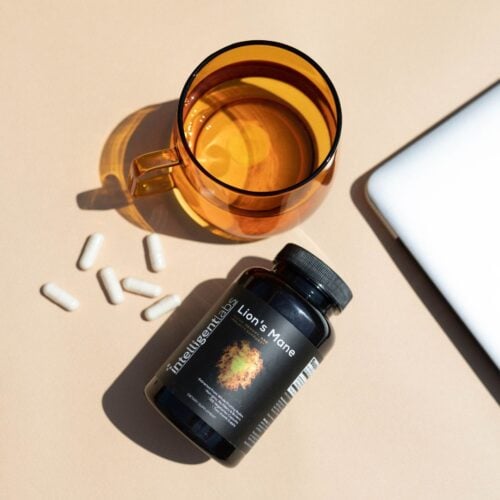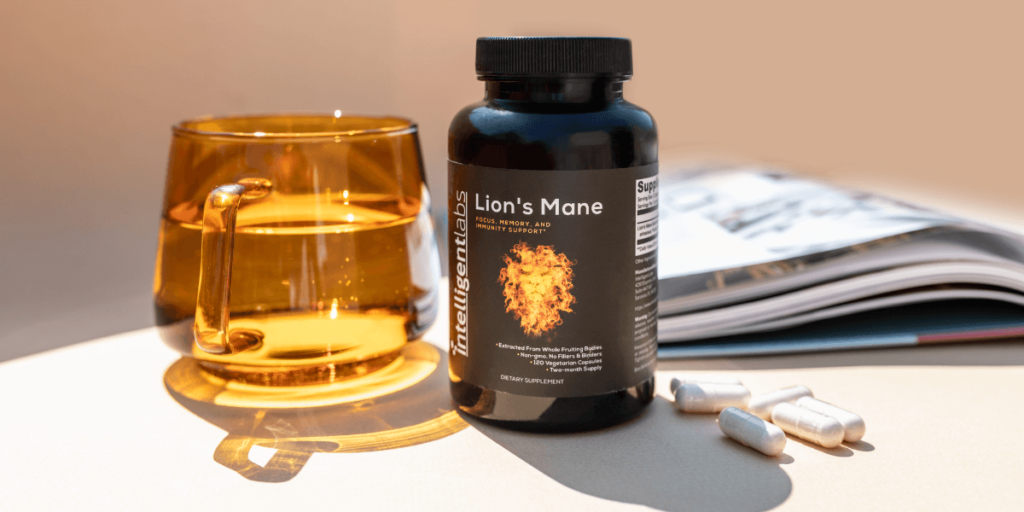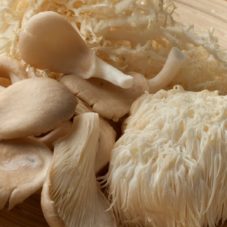Nootropics
Can Lion’s Mane Mushroom Help With Anxiety and Depression?
Lion’s mane mushroom is known for its unique look and delicious taste. It’s also quite popular as a natural nootropic thanks to its cognitive-enhancing benefits. But what about anxiety and depression? Can lion’s mane help the millions suffering from these mental health disorders? Let’s find out in this blog post!
Table of Contents
But first, does lion’s mane cause hallucinations?
Alright, let’s get this common misconception out of the way…
No, lion’s mane mushrooms do not cause hallucinations. It does not contain the chemical known as psilocybin, so it’s not psychoactive at all. Psilocybin is responsible for the hallucinogenic effects of the so-called “magic mushrooms”. You certainly don’t need to worry about being transported to another universe when taking lion’s mane!
Moreover, lion’s mane is neither addicting nor stimulating. It won’t give you a ‘high’ or send you crashing down to earth. You can safely stop using lion’s mane when you no longer want to take it.
Great, no hallucinations! So, can lion’s mane help with anxiety and depression?
Yes, there is evidence to show that lion’s mane may help improve symptoms of anxiety and depression.
While only a handful of clinical studies have been done so far, they corroborate the anecdotal evidence from ancient Chinese and Japanese traditional medicine (1). Here’s a list of supporting studies:
Study #1 (2019)
- Subjects – 71 overweight and obese patients
- Study duration – 8 weeks
Overweight and obese individuals have been found to suffer from mood disorders, including anxiety and depression. Researchers gave the subjects 500mg of lion’s mane extract 3x daily.
After 8 weeks, the subjects showed remarkable improvement in their depression and anxiety symptoms! They also slept better at night. Moreover, these positive effects continued two months after they stopped taking lion’s mane (2).
Study #2 (2010)
- Subjects – 30 menopausal women
- Study duration – 4 weeks
In this study, researchers divided the women into 2 groups. They gave each group a cookie containing either 500mg of lion’s mane fruiting body powder or a placebo. Four cookies were eaten daily, meaning the total dose was 2000mg.
After analyzing the data, researchers concluded that lion’s mane mushroom helped reduce depression and anxiety symptoms in menopausal women (3).
Study #3 (2015)
- Subjects – 8 female undergraduate students
- Study duration – 4 weeks
While the sample size for this study was relatively small, it also yielded interesting results. A patented formulation of lion’s mane mushroom was given to female students. The subjects reported improved sleep quality and anxiety, indicating that lion’s mane may help balance the mind and body (4).
Study #4 (2019)
A recent literature review highlighted the antidepressant activity of lion’s mane mushrooms. Both pre-clinical (animal) and clinical (human) studies they looked at showed the same thing – lion’s mane has the potential to help with inflammation, sleep, anxiety, and depression! (5)
Studies #5 and #6
Interestingly, people diagnosed with major depressive disorders have significantly lower nerve growth factor (NGF) levels. This is unfortunate because healthy NGF levels indicate the body’s ability to recover or regenerate damaged neurons. Neurons are the cells in our central nervous system, so they’re vital to mental and cognitive health (6).
The good news is that lion’s mane mushrooms can stimulate NGF. In fact, it’s the only mushroom that can do so (7)! By helping improve NGF levels, lion’s mane is very promising for those with anxiety and depression.
Related article: Lion’s Mane Mushrooms: The Ultimate Guide To Nature’s Brain Booster
Do all these studies prove that lion’s mane is the best mushroom for anxiety and depression?
This is a bit tough to answer as there are approximately 14,000 species of mushrooms. Some are edible and quite popular in culinary dishes. Others are medicinal. A few are ‘magical’. Plenty more are toxic and poisonous.
When it comes to anxiety and depression, however, only a few make it to the natural antidepressant and anxiolytic list. These include lion’s mane, reishi, agaricus blazei, and turkey tail (8).
While we cannot conclusively say lion’s mane is the best, it does seem to stand head and shoulders above other mushroom species. The studies we’ve linked to earlier support lion’s mane’s antidepressant and anti-anxiety benefits. Plus, don’t forget it’s the only mushroom that can stimulate NGF levels!
Can you take lion’s mane with antidepressants?
There have been no studies to indicate you may not take lion’s mane with antidepressants. However, it’s important to speak with your doctor before taking supplements, as they may interact with your medication.
How to take lion’s mane for anxiety and depression?
There are two ways to take lion’s mane for anxiety and depression. If they grow naturally in your area, you may be able to get them fresh! If so, check out our recipes for lion’s mane mushrooms here.

Alternatively, consuming them in dried or supplement form is a good idea, too. But we recommend choosing a supplement such as our Intelligent Labs Lion’s Mane Mushroom over simple dried powder. Here’s why:
1) We only use 100% fruiting body extract (this is the ‘real’ part of the mushroom you see growing above ground)
2) It’s standardized to contain a minimum of 25% beta-glucans (an important fiber with many health benefits) (9)
3) We use hot water extraction technique to ensure all the important compounds in lion’s mane are retained
4) No mycelium and no grain fillers (check the difference between mycelium and fruiting bodies here)
5) Manufactured at an NSF, GMP-certified facility to ensure quality
As for when to take lion’s mane, it’s up to you whether you want to take it in the morning or evening. If you want to take it for its nootropic and cognitive benefits, take it in the morning. But if you want to enjoy its sleep benefits, take lion’s mane before bed.
Final thoughts
There’s more to lion’s mane mushrooms than their looks and taste. As you’ve learned in this blog post, they may also help with anxiety and depression. So, the next time you feel the blues, or someone asks you how to make it go away, consider taking lion’s mane mushrooms!
References
(1) Neurological Activity of Lion’s Mane (Hericium erinaceus), Spelman, Kevin; Sutherland, Elizabeth; Bagade, Aravind, Journal of Restorative Medicine, Volume 6, Number 1, 12 March 2017, pp. 19-26(8)
(2) Hericium erinaceus Improves Mood and Sleep Disorders in Patients Affected by Overweight or Obesity: Could Circulating Pro-BDNF and BDNF Be Potential Biomarkers? Luisella Vigna, Federica Morelli et al. Published18 Apr 2019
(3) Nagano M, Shimizu K, Kondo R, et al. Reduction of depression and anxiety by 4 weeks Hericium erinaceus intake. Biomed Res. 2010;31(4):231-237. doi:10.2220/biomedres.31.231
(4) The effects of Hericium erinaceus (Amyloban® 3399) on sleep quality and subjective well-being among female undergraduate students: A pilot study, Hisayoshi Okamura, Nobuko Anno et al. Personalized Medicine Universe, Volume 4, July 2015, Pages 76-78
(5) Chong PS, Fung M-L, Wong KH, Lim LW. Therapeutic Potential of Hericium erinaceus for Depressive Disorder. International Journal of Molecular Sciences. 2020; 21(1):163.
(6) Significantly lower nerve growth factor levels in patients with major depressive disorder than in healthy subjects: a meta-analysis and systematic review, Yen-Wen Chen, Pao-Yen Lin et al. Neuropsychiatr Dis Treat. 2015; 11: 925–933.
(7) Mori K, Obara Y, Hirota M, et al. Nerve growth factor-inducing activity of Hericium erinaceus in 1321N1 human astrocytoma cells. Biol Pharm Bull. 2008;31(9):1727-1732. doi:10.1248/bpb.31.1727
(8) Medicinal Mushrooms: Bioactive Compounds, Use, and Clinical Trials, Giuseppe Venturella, Valeria Ferraro et al. Int J Mol Sci. 2021 Jan; 22(2): 634. Published online 2021 Jan 10.
(9) Effects of fungal beta-glucans on health – a systematic review of randomized controlled trials, Marigoula Vlassopoulou, Mary Yannakoulia et al. DOI: 10.1039/D1FO00122A (Review Article) Food Funct., 2021, 12, 3366-3380




